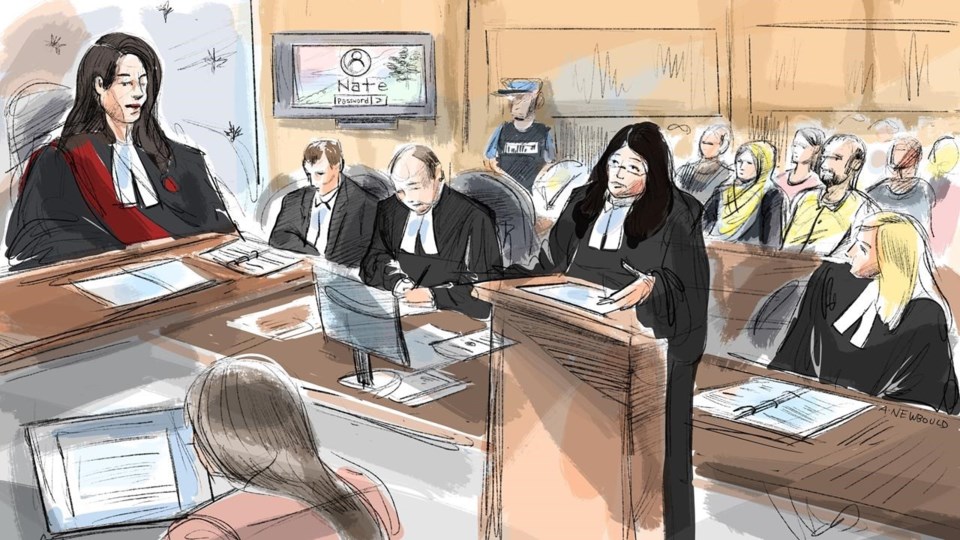WINDSOR, Ont. — A man accused of killing a Muslim family in Ontario penned what prosecutors have called a manifesto in the weeks before his attack, a jury heard Wednesday, describing himself as a white nationalist and peddling conspiracy theories about Muslims and a so-called white genocide.
The jury also heard devices linked to the accused were used to download and repeatedly access the manifestos of notorious right-wing extremist mass killers and violent shooting videos.
Nathaniel Veltman is accused of deliberately hitting five members of the Afzaal family with his truck while they were out for a walk in London, Ont., in an alleged act of terrorism. He has pleaded not guilty to four counts of first-degree murder and one count of attempted murder.
Veltman sat beside his lawyer and appeared expressionless in a Windsor courtroom Wednesday as Crown attorney Sarah Shaikh read portions of the document to the jury.
Veltman's lawyers agreed he authored the document titled "A White Awakening."
In it, he baselessly referred to conspiracy theories about ethnic replacement, white genocide and "Muslim grooming gangs," and then called on others to make life "very uncomfortable" for Muslims so they are "driven out of our countries fast."
"European-founded countries have had countless violent revolutions," it read. "Why can't we have one again?"
It ends with the same line as a manifesto authored by the gunman behind the 2019 New Zealand mass killing of 51 Muslim worshippers at two mosques.
The jury has seen video of Veltman telling police the New Zealand shooter was an inspiration to carry out what he called his own politically motivated act of terrorism.
Salman Afzaal, 46; his 44-year-old wife, Madiha Salman; their 15-year-old daughter, Yumna; and her 74-year-old grandmother, Talat Afzaal, were killed in the attack, while the couple's nine-year-old son was seriously hurt but survived.
Veltman's case is the first where Canada's terrorism laws are being put before a jury in a first-degree murder trial.
A Windsor police digital forensics expert who analyzed devices linked to Veltman testified Wednesday that the New Zealand killer's manifesto and a first-person video the gunman took of the mass shooting were downloaded to devices linked to Veltman in February.
The video and the manifesto would be opened repeatedly over the following months, Sgt. Liyu Guan testified. The manifesto, he said, was opened an hour before the alleged attack on June 6, 2021.
Guan testified that the manifesto of a Norwegian right-wing extremist, who in 2011 killed eight people by bombing government buildings in Oslo and another 69 people in a shooting at a youth camp, was also downloaded to a phone owned by Veltman in April 2021.
An agreed statement of facts read before the jury Wednesday said Veltman was the author of all versions, including previous versions, of "A White Awakening."
Guan testified that an early version of the document, titled "idk," first showed up on May 4 and would be added to on May 24. The contents of that document would be copied on June 1 to a new text document titled "A White Awakening."
In the document laced with racist slurs, Veltman wrote that he holds no ideology and then later called himself a white nationalist, labelling nationalism as a "natural desire" and claiming multiculturalism doesn't work.
He goes on to write about the need to create a "new society" where "all white people have a sense of belonging."
He claimed "European people will go through hell" before they are freed from "wretched tyrannical powers," and that they have "the right to defend themselves by any means possible" from the harm "currently being inflicted upon them."
The jury has seen video of Veltman telling police after the attack that he was against Muslims because he did not believe in multiculturalism, was against mass immigration and did not believe cultures could coexist. Court also heard Veltman tell a detective he had hesitated before carrying out his attack but decided to get it “over with,'' hoping to inspire other young white men.
The defence briefly cross-examined Guan on Wednesday. Lawyer Christopher Hicks noted Guan found another person's credit card information on Veltman's laptop, and asked whether it was possible that person had access to the computer.
Guan said there was overwhelming information on the laptop to relate it back to Veltman -- including copies of his passport, driver's licence and emails -- and only the one piece of credit card information and a YouTube search connected to the other person.
The trial is set to resume Thursday.
This report by The Canadian Press was first published Oct. 4, 2023.
Jordan Omstead, The Canadian Press




